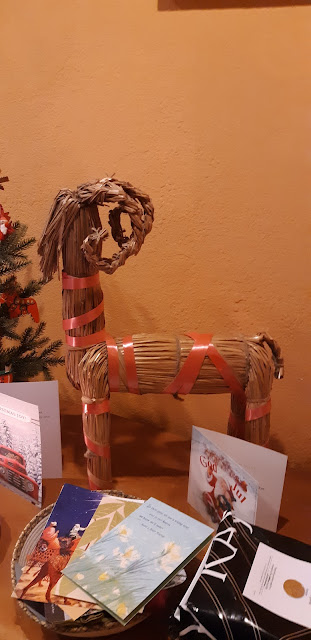The origin of the Yule goat can be traced to pagan celebrations related to Thor, the god of thunder, who rode across the sky in a chariot drawn by two goats, Tanngrisnir and Tanngnjostr, which translates to Teethbearer and Teethgrinder.
In olden days in Sweden, people believed that the Yule goat was an invisible spirit that came to make sure Yule celebrations were prepared for properly.
Then people began to imagine the goat and made a wood base that they covered with straw tied together with red ribbons.
And now the straw goat with his pretty red ribbons can be found under most Swedish Christmas trees.
Back to Thor's goats:
Much as Thor's goats were cared for, they could also end up on the dinner table, as told in one of the sagas of the Poetic Edda.
To be put back together the following day.
Strict instructions by Thor to the diners: "Make sure to not break any bones."
When at one such meal a bone was broken, one of the goats ended up limping after being put together again the following day.
What is the Poetic Edda? Well, I didn't know. I knew about the Prose Edda, but not that there were two.
So, of course, I googled it and learned that the Poetic Edda is the modern name for an untitled collection of Old Norse anonymous poems.
Which you can actually buy for $11.49 on Amazon, where it has 3,395 reviews, ending in a five-star rating.
Reading this, my mind flashed back to one of the ancient poets, long since dead, returning to life to find his poems part of a collection for sale on Amazon, so well liked, so many stars.
If you read this far, thanks for letting my mind wander back to the culture of my ancestors, as it must be because I feel a strong connection.
Just one more thing.
The Norse sagas left parts of their culture behind.
The days of the week, for example, even in English:
Sunday: Sol, the Sun
Monday: Mani, the Moon
Tuesday: Tyr, the god of war
Wendesday: (W)Odin, the king god of wisdom
Thursday: Thor, the god of thunder
Friday: Freya, Odin's wife, goddess of love and fertility
Saturday: See below.
In English:
It comes from the Middle English Saturdai, from the Old English Saternesdæg, which is a partial translation of the Latin Sāturnī diēs, meaning “Saturn's day.” The ancient Romans named the day we call Saturday after the planet Saturn, which was named for their god of agriculture.
In Swedish:
Lördag is the Swedish name for Saturday, which comes from the Old Norse name laugardagr which meant 'bathing day'. Laug meant 'pool' or 'lake' and dagr meant 'day'
So this was simply the day that my ancestors took a bath -- or washed up as best they could. A bit more mundane than being named for a planet that, in turn, was named for Saturn, the Roman god of agriculture.


